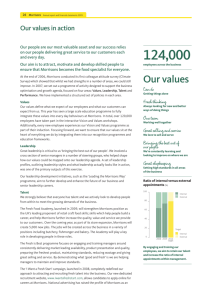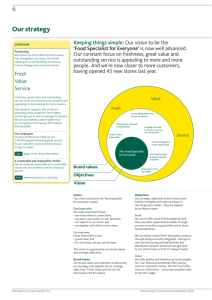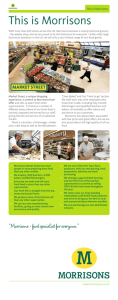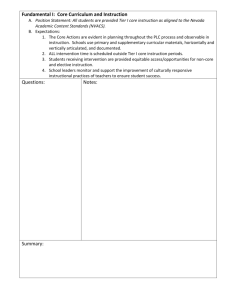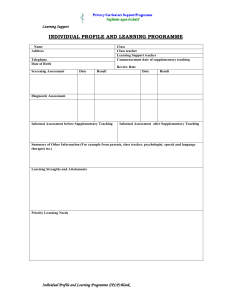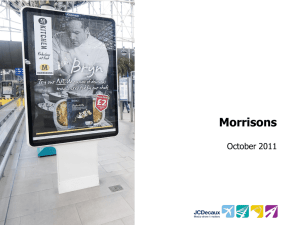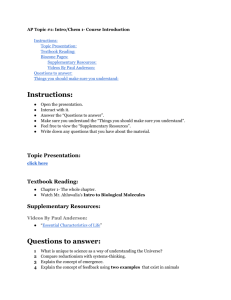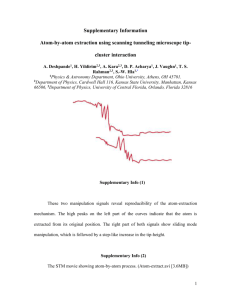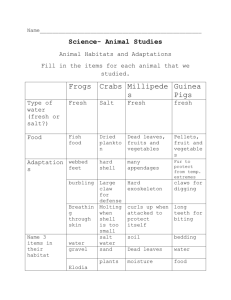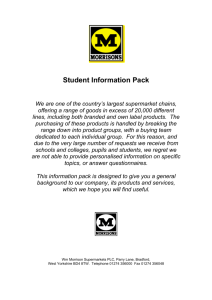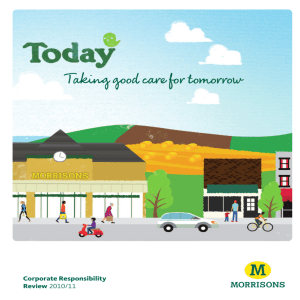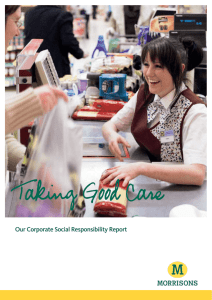our year and our business
advertisement
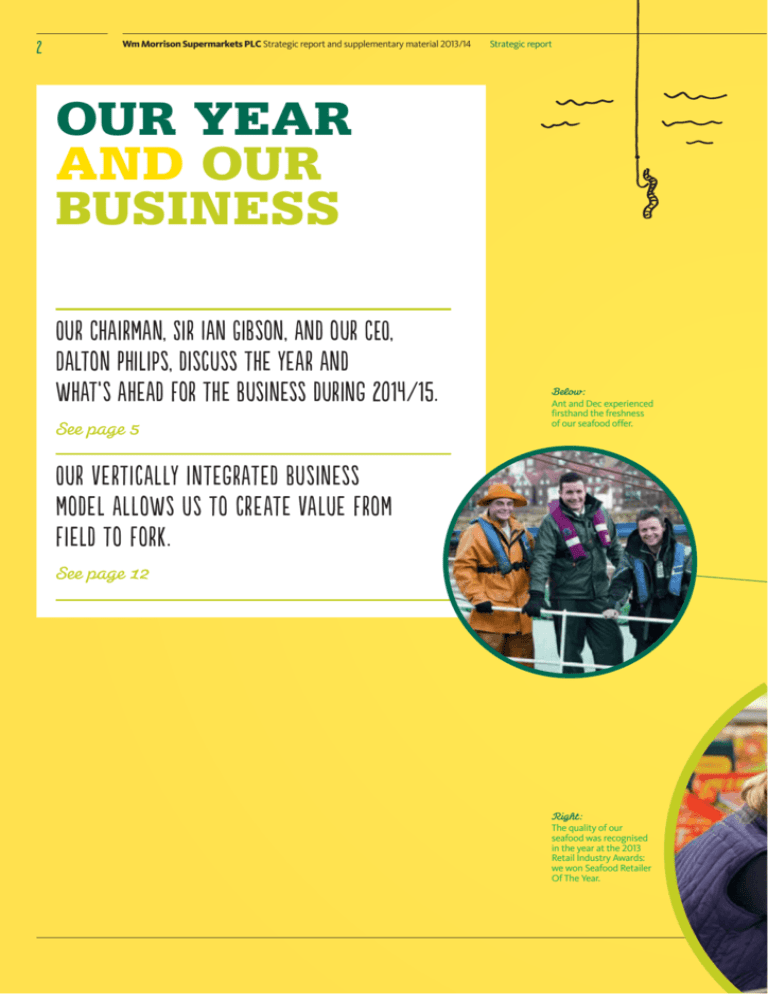
2 Wm Morrison Supermarkets PLC Strategic report and supplementary material 2013/14 Strategic report OUR YEAR AND OUR BUSINESS !"#$%&$'( See page 5 Below: Ant and Dec experienced firsthand the freshness of our seafood offer. )! model allows us to create value from *( See page 12 Right: The quality of our seafood was recognised in the year at the 2013 Retail Industry Awards: we won Seafood Retailer Of The Year. Wm Morrison Supermarkets PLC Strategic report and supplementary material 2013/14 f (((By ou h ly p r e p a r e d ( ( ( Strategic report A r u o ll +res e r a ish 3 ge r e , per t fishmon rs e r o t s In Supplementary Supp e e ta y material ate a Above: Our fishmongers are on hand to offer advice and prepare fish to customer specification. Wm Morrison Supermarkets PLC Strategic report and supplementary material 2013/14 4 Strategic report Business overview THIS IS MORRISONS Morrisons has grown from a market stall in Bradford to the UK’s fourth largest supermarket group. WHO WE ARE At Morrisons, we stand for value without compromise. We are, and always have been, a value-led grocer, British born and bred. We are focused on food, with unrivalled service and skill in producing and selling fresh food. We have our own manufacturing plants that supply our stores to ensure that we sell only the best products. Our vertical integration gives us both transparency and control over the provenance and safety of our supply chain as well as the flexibility to meet the demands of customers. We have adapted to the changing demands of our customers by launching a multi-channel approach that offers the same great supermarket experience to customers in convenience stores and online. 77 4 MANUFACTURING FACILITIES We process 40% of the fish we sell in store at our Grimsby site. Key 95 Distribution centres Manufacturing 25 Morrisons M local Supermarkets 113 11 ONLINE Our online delivery service now covers two areas of the UK, we will cover 50% of UK households by the end of 2014. 107 111 FRESH Our vertically integrated supply chain and strong supplier relationships ensures only the freshest produce is sold in our stores. 36 26 in Y e s t e r d ay I w a s i r e olnsh A field in Linc $$(- customers visit stores per week '15 6'### .#' /"'0## of the fresh food that we sell, we make ourselves online deliveries between 10 January and 9 March 2014 stores across UK, of which 102 are convenience stores number of colleagues Wm Morrison Supermarkets PLC Strategic report and supplementary material 2013/14 ' Chairman’s review A DIFFICULT YEAR AND A STRATEGIC SHIFT Strategic report Over the past year, the grocery market has remained challenging. Consumers have had to deal with difficult economic conditions and many have been constrained financially. They have had to make trade offs in their spending, doing this through their choice of format, choice of products or simply buying less food. This was reflected in market growth slowing in the final quarter of the year. In this environment the discount sector has performed strongly, driving much of the market growth. We believe that, unlike previous cycles, its performance is structural rather than cyclical. The rest of the market has been working hard to counter this threat, with particular emphasis on loyalty programmes and personalised couponing, areas in which Morrisons has not been able to compete effectively fully to date due to outdated IT infrastructure and systems. Sir Ian Gibson Chairman We have also described our plans to increase value elsewhere in the business in our financial strategy on page 9. STRUCTURAL CHANGE +7879:7;< MEANS A STRATEGIC =+<+7977>( I am pleased to report that we have made considerable progress in advancing the strategic initiatives that we set out at the beginning of the year and which are laying the foundation for the long term future of our business. In particular, and over a very short timeframe, we have successfully launched our own innovative, online food proposition which will be available to half of UK households by the end of the current financial year. We have also made considerable progress in developing our convenience network and now have over 100 M locals with dedicated distribution centres serving the North West as well as London and the South East. The Board’s confirmation of a 10% increase in the dividend for the year, in line with its stated target, and its commitment to a minimum 5% increase in 2014/15 demonstrates its confidence in the future of the business. RESULTS In the year, total turnover of £17.7bn was down 2% (2012/13: £18.1bn). When compared to prior year the underlying operating margin of 4.9% fell by 40bps. This increased to 50bps after adjusting for the impact of a lower proportion of fuel sales in the mix this year. Net finance costs of £82m increased by £12m over the prior period as a result of a planned increase in net debt to accommodate our peak investment of capital expenditure. Underlying profit is calculated after removing property disposals, new business development costs, non-recurring exceptional costs and IAS19 pension interest. Underlying operating profit of £865m fell by 11% when compared to the prior year, with underlying profit before tax of £785m, down by 13%. Supplementary material Whilst these factors, and the fact that we do not yet have a meaningful presence in online and convenience, the two fastest growing channels in the grocery market, have clearly held us back, the overall performance of our core business has been disappointing. We have committed to address this through a significant and sustained investment in our proposition that underpins our determination to offer the best value, price and quality for our customers. We will reset the profit base of the business to deliver this. Details of our investment plans are set out on pages 24 to 26. 6 Wm Morrison Supermarkets PLC Strategic report and supplementary material 2013/14 Strategic report Chairman’s review A DIFFICULT YEAR AND A STRATEGIC SHIFT CONTINUED RESULTS – CONTINUED Exceptional non-recurring costs of £903m were charged in the year including £163m in relation to Kiddicare, a business which is no longer strategic. We will look to sell this business in 2014. £319m relates to elements of our store pipeline. Following a reassessment of their potential to meet our required investment criteria we have impaired £90m of costs to date and provided for £229m of further costs. A charge of £379m has been incurred in relation to trading stores, comprising of £330m of impairment and £49m of onerous lease provisions. A further cut in the rate of corporation tax and the positive impact of the Group’s equity retirement programme partly helped to offset the impact of the reduction in underlying earnings on earnings per share (EPS). Underlying basic EPS decreased by 8% to 25.2p (2012/13: 27.3p) with statutory basic earnings per share of (10.2)p (2012/13: 26.7p). As planned, capital expenditure and investments, including joint ventures, rose slightly to £1,086m, an increase of £70m (7%) over prior year. This included capital relating to the launch of our online food operation, in conjunction with Ocado. The programme also reflected an acceleration in our convenience store opening programme, further expansion of our vertical integration capacity and the conclusion of the major phase of our six year IT systems development project. We are committed to capital discipline. New core grocery space will reduce, our IT infrastructure is close to completion and our online food business is now operational, therefore 2013/14 marks the peak of our capital investment. In 2014/15 we expect capital expenditure to reduce by around 50% to £550m. Thereafter we expect it to be maintained at a level of £400m annually. During the year we concluded the £1bn equity retirement programme we launched in 2011 with a final investment of £53m. The Group’s net debt grew, as planned, during the period, to £2,817m, (2012/13: £2,181m). Gearing increased to 60%, which has been impacted by the write down of assets. We anticipate that we will generate significant free cash flow in 2014/15 and that net debt will fall during the year to around £2.4bn – £2.5bn. The Group continues to maintain a strong balance sheet in line with our stated principles. This is securely financed by a number of long dated bonds and by revolving credit facilities of £1,350m with our banks of which £775m remained undrawn at the end of the year. In June 2013 we increased the funds available to the Group and further improved the maturity profile of our borrowings, by issuing a €700m Euro bond with institutional investors, repayable in 2020. Return on capital employed (ROCE) is a key performance measure for the Group and underpins our focus on capital discipline. 2013/14 marked a peak year of investment for the business and, as a result, ROCE fell to 8.4% after the effect of non-recurring exceptional costs (2012/13: 9.6%). We are committed to delivering improved shareholder returns over time. INDUSTRY RECOGNITION Morrisons is committed to providing its customers with great fresh products from sustainable sources, backed by unrivalled service from our own in-store colleagues with craft skills. We are delighted that this has again been recognised with a number of prestigious industry awards. These include: ‘Most sustainable retailer of the year’, ‘Seafood retailer of the year’ and ‘Fresh produce retailer of the year’ at the 2013 Retail Industry Awards and BitC’s European CSR Award. Our support for our colleagues in making Morrisons a great place to work has been recognised by the award of ‘Employer of the year’, for the fourth consecutive year, at the Grocer Gold Awards 2013. COMMUNITY AND THE ENVIRONMENT How we operate as a business is very important to us. We care about where our products come from, the people that make them and how products are bought, made, moved and sold. Our customers expect us to trade responsibly and we work within the communities in which we operate, to manage resources carefully whilst maintaining ethical standards. We have a number of key programmes which support our commitment. These include the Morrisons farming programme, the objective of which is to work closely with the UK farming supply base to ensure that it’s fit for the future; our Ethical Trading Code, which is incorporated into our terms and conditions with suppliers and includes payment of a living wage, non-excessive working hours and a safe working environment; GSCOP compliance; and our ‘Great Taste, Less Waste’ campaign focusing on consumer food waste. Supporting the LOCAL Community OUR COLLEAGUES Our industry awards were only achieved through the dedication, hard work and commitment to the cause of our 125,000 colleagues across the business who every day seek to delight the nearly 12m customers on average who visit our stores each week. I am pleased that their efforts, in what has been a challenging year for the business, have enabled them to share a profit share pool of £28m this year. Colleagues are key to being able to fulfil our promises and providing the best service to our customers. We believe in building a healthy, high-performance culture and providing equal opportunities for all. On behalf of the Board I wish to thank every one of our colleagues for their dedication, professionalism, service and commitment to our business throughout the year. Sir Ian Gibson Chairman Wm Morrison Supermarkets PLC Strategic report and supplementary material 2013/14 7 Chief Executive’s review A CLEAR VISION & STRATEGY Total turnover in the period fell by 2% to £17.7bn (2012/13: £18.1bn). Store sales excluding fuel, but including for the first time, a contribution from our new online food business, increased slightly by 0.1%1. Of this, new store openings contributed 2.9%, with like-for-like sales decreasing by 2.8%1. Fuel sales fell by 6.3%1 reflecting both a fall in the average price paid for fuel at the pump as oil prices eased during the year, and a reduction in volumes as consumers continued to manage their budgets carefully. Other sales increased by 30% to £262m (2012/13: £201m) as we developed external sales channels to absorb surplus capacity in our manufacturing operations. Dalton Philips Chief Executive New business development costs, which include the trading losses of our new channels, online and convenience as well as the losses associated with the new stores in Kiddicare, increased as planned to £66m (2012/13: £17m). We generated £9m profits on the disposal of some investment properties. Exceptional non-recurring costs of £903m were charged in the year including £163m in relation to Kiddicare, which is no longer strategic. We will look to sell this business in 2014. £319m relates to elements of our store pipeline. Following a reassessment of their potential to meet our required investment criteria we have impaired £90m of costs incurred to date and provided for £229m of further costs. A charge of £379m has been incurred in relation to trading stores comprising £330m of impairment and £49m of onerous lease provisions. OPERATIONAL highlights J""(-' $$5 107 1# Average basket spend (LFL basis) Market share Total stores opened in 2014 Convenience stores opened in 2014 1 52 weeks to 2 February 2014 compared to 52 weeks to 3 February 2013. Supplementary material K:7:>:PK:Q KPPV:W:P8V7:> X=P>8<97 V8Q7:<+=:PQ :>K<=:( With Group turnover falling by 2% and with inflation a continuing cost headwind, we have had to manage our cost base very tightly across the whole of the business. Cost control has been a key focus throughout the year, whilst continuing to ensure that we provide high levels of service to our customers throughout. In doing this we have been able to further take advantage of the efficiency opportunities afforded by the investment we have made in our IT systems. This has enabled us to improve processes significantly across the business, reducing our in-store labour costs and delivering further productivity improvements in distribution. We have successfully met our target of £300m from our efficiency initiatives over the three years to 2013/14. Strategic report TURNOVER 8 Wm Morrison Supermarkets PLC Strategic report and supplementary material 2013/14 Strategic report Chief Executive’s review A CLEAR VISION & STRATEGY CONTINUED OPERATING results MARKET overview TURNOVER ANALYSIS Over the past year, the grocery market and consumers have continued to face challenging economic conditions. Many customers have been constrained financially and have had to choose carefully where they shopped, which products they bought and in what quantity. Personalised value is playing an ever-increasing role in consumers’ choice of store as customers seek out the best value for them. In-store (£m) Fuel (£m) Other sales (£m) Total turnover (ex-VAT ) (£m) In-store sales – Sales per square foot (£) – Customer numbers per week (m) Customer spend (£) Like-for-like stores Other Sales 2013/14 Total 2012/13 Total 12,990 3,878 – 16,868 444 106 262 812 13,434 3,984 262 17,680 13,674 4,241 201 18,116 19.20 11.2 22.36 11.50 0.6 14.47 18.78 11.8 21.96 19.84 11.4 22.63 2013/14 £m 2012/13 £m OPERATING RESULTS Turnover Gross profit Gross profit margin % Other operating income Administrative expenses Non-recurring exceptional costs Property transactions Operating (loss)/profit New business development Non-recurring exceptional costs Property disposals Underlying operating profit Underlying operating profit 17,680 1,074 6.1% 81 (356) (903) 9 (95) 66 903 (9) 865 4.9% 18,116 1,206 6.7% 80 (336) – (1) 949 17 – 1 967 5.3% In the year the UK grocery market grew by 3.4% and was worth £104bn. This growth was primarily driven by inflation as volume growth continued to be flat to negative. Growth fell from c.4% over the first half of the year to just under 3% in the second half, in line with a fall in inflation. Over the year the Consumer Price Index (CPI) fell from 2.7% to 1.9%, with the food and drink sector a strong contributor to this decrease. Consumers saw a fall in real earnings and although consumer confidence improved during the year, this was driven by perceptions of the economic situation, rather than a marked improvement in how they viewed their own financial situation. As a result the family budget continued to be under pressure. This has resulted in baskets being spread across multiple formats and multiple retailers and a continuing shift in the market away from core supermarkets. Convenience, online and the discount channels are the fastest growing sectors of the market and this trend is expected to continue. This will be reflected in changing format development as retailers look to align with ever evolving customer needs, behaviours and attitudes. The UK online food market is worth £6.5bn today. By the end of 2014, the online grocery market is expected to grow to £7.7bn, up 18% on 2013 and is forecast to grow to £14.6bn by 2018, when it is expected to account for 7.1% of the total UK grocery market, almost double what it is today. It presents an exciting opportunity for Morrisons. This strong growth trend is also evident in the convenience market, as shoppers adopt more of a little and often approach at the expense of big basket weekly shops. The convenience market, which is growing at 4.9%, represents a huge opportunity for Morrisons. It is currently worth £36bn in the UK and is expected to grow by 30% to £46bn over the five years to 2018, well ahead of the grocery market. The year also marked the emergence of the discount sector as a significant and growing force in the market, it is currently worth £9.5bn, up 20% over prior year. This reflects a fundamental shift in the market and one that is likely to be structural rather than cyclical. It is a challenge that we will address in 2014/15. Left: This year we significantly grew our convenience estate. Wm Morrison Supermarkets PLC Strategic report and supplementary material 2013/14 1 We’re continuing to open )develop and do more of what matters ( Morrisons business has traditionally been based on strong financial principles: conservative and prudent accounting policies, well funded pension schemes, a robust balance sheet and a strong, investment grade credit rating. We have identified significant opportunities to generate substantial free cash flow through growth, meaningful reductions in capital expenditure, improved management of our working capital and from property disposals. We will maintain our balance sheet strength, underpinned by a disciplined approach to capital management, supported by a commitment to a strong, investment-grade, credit rating over the medium term. CAPITAL EXPENDITURE Our capital expenditure programme has three elements: the maintenance of our asset base, the development of our infrastructure and the growth of our new channels and manufacturing capability. The total of £1.1bn that we spent in 2013/14 represents the peak level of our capital expenditure investment and will reduce significantly in the years ahead. As a result of these measures, our requirement for capital expenditure has been reduced significantly from its current year level of £1.1bn, and from previous guidance, to £550m in 2014/15, reducing to around £400m annually thereafter. WORKING CAPITAL Our ongoing investment in upgrading IT systems across the whole business continues to progress and will provide significant opportunities to optimise our control of working capital, particularly in relation to inventory and the management of our supply chain. Supplementary material Our future top line growth will be driven principally through the fast growing online and convenience channels, both of which are relatively capital-light compared to developing new supermarket space. Accordingly our investment focus in future will be on these channels. We will only acquire new supermarket sites in exceptional circumstances. : ! Strategic report FINANCIAL strategy 10 Wm Morrison Supermarkets PLC Strategic report and supplementary material 2013/14 Strategic report Chief Executive’s review A CLEAR VISION & STRATEGY CONTINUED PROPERTY Morrisons property portfolio has an estimated market value of around £9bn. Over 90% of our core estate is freehold, a considerably greater proportion than our major competitors. As indicated at our Interim Results we have been reviewing opportunities to manage our property portfolio more actively than we have historically, in order to release surplus cash whilst improving shareholder returns. This review has been undertaken on the basis that we will: value the clear control and flexibility benefits associated with freehold ownership of stores; retain an overwhelmingly freehold position in our core estate – strongest in the sector; maintain a strong, conservative and prudent capital structure; and not change the risk profile of the Company. It is expected that the freehold element of our core estate will not fall below 80%, the highest ratio in the sector. Morrisons property portfolio has an estimated market )J1( )1#5 greater proportion than our \ ( In line with these criteria we plan to monetise some £1bn of property value by 2016/17. We will do this principally through the disposal of our non-core assets, our development assets, our newer distribution assets and our investment properties including, in a small number of cases where it makes sense to do so, the associated stores. We expect to realise £400m – £500m of disposals in 2014/15. SHAREHOLDER RETURNS The current year is the final year of a three year commitment, made in March 2011, to provide a minimum annual dividend increase of 10%. The Board’s confidence in Morrisons strategic direction and the long-term prospects of the business is reflected by its commitment to a progressive dividend policy, moving to two times cover over time. This is underpinned by a commitment to a minimum 5% increase in 2014/15. CAPITAL ALLOCATION At our Interim Results announcement in September 2013 we set out a framework by which we would allocate capital within our business. Our first priority is to invest to support our estate and infrastructure and to reduce our cost base. Thereafter we will seek to maintain debt ratios which support a strong investment grade credit rating, before investing in profitable growth opportunities and paying dividends in line with policy. Any capital which is surplus to these requirements will be returned to shareholders over time. We anticipate that the combination of a reduction in capital investment, improvements in our working capital and an active property estate management programme as set out above, will lead to the generation of significant free cash flow. Subject to our commitment to an investment grade credit rating over the medium term, this will be returned to shareholders in an appropriate form, to be determined at the start of each financial year. Our balance sheet is strong. We have a valuable real estate portfolio, which provides great flexibility to the business. We will realise value from our property portfolio, whilst retaining a significantly higher freehold mix than our peers. We have substantial free cash flow generation opportunities. Overall, we expect to generate £2bn of free cash flow in the three years to 2016/17. Wm Morrison Supermarkets PLC Strategic report and supplementary material 2013/14 11 Our vision is to be a multi-format, multi-channel grocer. We are, and always have been a value-led grocer. We are committed to consistently low prices, great fresh food quality with friendly, skilled service at the heart of our business. £ Morrisons is different; building on our unique heritage we provide a distinctive fresh food offer to our customers based around our craft skills and our vertically integrated manufacturing business. These differences set us apart from all our competitors and position us to succeed. Local We constantly seek to improve the way we do business, doing more of the things that matter for our customers: making outstanding fresh food, offering outstanding service and delivering great value. We also seek opportunities to develop the business profitably through new formats, channels and categories, to meet the evolving needs of our existing customers and to attract new customers. OUR convictions Above: Our vision is to be a multi-format, multi-channel grocer. Value is forever Food focused not generalist Experiential over purely functional Skills not just drills General merchandise – clicks not bricks Multi-format and multi-channel Whilst these convictions, which form the basis of the business we are building today, are as relevant now as when we first set them out in 2012, the grocery market is undergoing a structural shift. The online and convenience channels continue to grow rapidly and the discount sector is expanding at pace, core supermarkets are under pressure. We will address these challenges. Our strategy to compete in this intense market is to invest significantly in our core value proposition whilst accelerating our presence in the online and convenience channels. Dalton Philips Chief Executive Supplementary material Our strategy reflects our view of how the market will evolve, what will be most appealing to our customers and how we make best use of our existing capabilities. It is based on six convictions about the type of business that our customers want us to be: Below: In 2014/15 we will respond to the changing market place by reinforcing our core proposition. Strategic report STRATEGY Wm Morrison Supermarkets PLC Strategic report and supplementary material 2013/14 12 Strategic report Our business model WHAT WE DO We are the only leading UK grocer that can claim a business model that is involved from field to fork. HOW we create value We make things Or we things Morrisons is different because we make many of the products that we sell either in store or via our own manufacturing sites. We effectively own, operate and control a greater proportion of our fresh food supply chain than is typical for major grocery retailers in the UK. We work with suppliers from across the globe to source the best products for our customers. We make more than half of the fresh food we sell in store every day, which means we are the second largest fresh food manufacturer in the UK. Food made by us is sold in our core and convenience stores as well as online. We are able to buy direct from farmers and suppliers and utilise more of what we buy in our own abattoirs, manufacturing and processing sites. We buy whole animals and have the capability to process whole crops. By having a greater degree of control over more of our fresh UK food chain, we are able to drive efficiency through flexibility from farm gate to our customers. Our operation also benefits from a waste perspective. We have qualified butchers, bakers and fishmongers in our stores, adding flexibility to the shopping experience, enabling customers to: We pride ourselves on buying as much fresh food in the UK as we can. For example, we have a strong connection with British livestock farmers and longstanding relationships with our suppliers. Some 95%* of all of our fresh meat purchased is British sourced. Supporting sustainable supply chains through purchasing is a significant part of our commitment to responsible business. Where we are able to influence the supply chain, we do so by balancing economic, environmental and social considerations as well as the interests of our customers, shareholders and suppliers. For example, our external suppliers are required to abide by our Ethical Trading Code, adhering to responsible working practices. To ensure our high quality standards are being met we have developed our own Morrisons Manufacturing Standard. The majority of suppliers who provide products for the Morrisons brand have been audited against the Standard to ensure the quality of what we offer our customers in store. tailor their meat and fish to suit preferences; buy freshly baked goods each day; and pick up hot food to go, offering a convenient, high quality alternative to cooking at home. Then we move them Our logistics operation is vital to our supply chain, giving us flexibility in how we move products from suppliers to distribution centres and from our food manufacturing sites to our stores. This ensures greater control over freshness, cost efficiencies and carbon management. We operate seven regional distribution centres servicing our core supermarkets, plus two convenience distribution centres. Our fleet consists of more than 2,300 tractors and trailers that cover over 100m kilometres per year. Our scale of operation allows us to reduce costs and increase efficiency throughout our supply chain. Significant improvements have helped us to drive carbon reduction initiatives including environmentally efficient distribution centres, vehicle fleet maintenance to maximise fuel efficiency and double-decker trailers to improve carrying capacity. Morrisons.com home deliveries are supported through our service agreement with online retailer, Ocado. This allows us to use technology and distribution operations that are first class, thoroughly tested and adaptable so that they can be rapidly expanded. The channel is supported by our state of the art Customer Fulfilment Centre in Dordon. * By weight Wm Morrison Supermarkets PLC Strategic report and supplementary material 2013/14 13 ]^_= ]^ qxz]^; `b-j Strategic report HOW we are different And sell them in our stores or online W Passing savings on to the customer Our vertical integration model allows us to take cost out of the supply chain to pass on to customers. Honest, clear pricing Transparent promotions and clear shelf edge pricing giving our customers flexibility. Quality If a customer is not 100% satisfied, neither are we. We offer refunds and replacements on products prepared by us. Reducing our waste Buying whole animals and crops direct from farmers and processing through our own operations eliminates needless waste. Service Hello, Offer, Thank (HOT) service HOT customer service provides enhanced perception, engagement and loyalty. Skilled colleagues Investing in our colleagues allows us to deliver excellent customer service, providing continuous development and improvement. Innovation Our multi-channel, multi-format offer is tailored to give a unique customer experience, reinforcing our fresh credentials. Availability In store, our operation allows us to react quickly and efficiently to customer needs, catering for local demand. In our core stores, we provide a distinctive shopping environment, showcasing our fresh credentials, the food we make and the talents of our colleagues. We sell our products in a responsible way. For example, by introducing store efficiency projects we have significantly reduced operational emissions across our estate. Our distinctive customer experience extends to our convenience and online channels as well. Our product range includes Morrisons own brand ranges, giving the customer the flexibility to choose the right products to suit their needs at a price that is right for them. Through ongoing product reformulation, the provision of clearer nutritional information and strong promotions, we are also helping customers to make healthier choices. Our convenience stores also showcase the Morrisons difference. We have created a convenience shopping experience that captures the benefits of our vertical integration capability. Leveraging our core strengths, we have developed a proposition that tailors stores to meet local needs, with 50% of sales space dedicated to fresh food, with a price leading proposition. Our online grocery business combines our expertise and experience in fresh food with industry-leading technology and logistics. The channel will reach 50% of UK households by the end of 2014. Our virtual craftsmen and women provide our online customers with the same high standards of fresh preparation they would get in our stores, and our doorstep freshness check is a first in the UK market. K!!our shareholders \! !,) PP:8) ( Read about the key relationships that underpin our business model See page 32 Supplementary material + From field to fork in hours Controlling food provenance, safety and quality. Monitoring to our standards Through our Ethical Trading Code and Manufacturing Standard. Prepared by us Making more fresh food than any other supermarket. Efficiencies through our operation Getting food onto our shelves fresher and faster.
